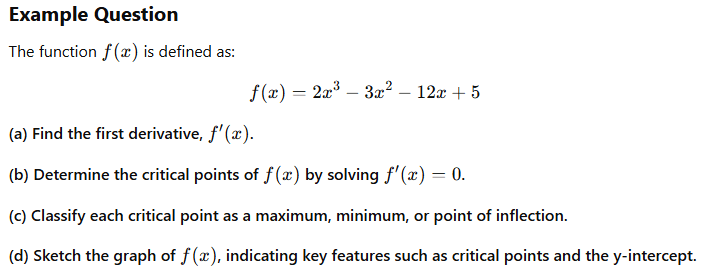
GCSE Maths vs A-Level Maths: How Big Is the Jump?
23/12/2024 / Maths TutoringFor students who have successfully navigated GCSE Maths, the next challenge on the horizon is A-Level Maths. This transition is often described as one of the biggest leaps in education, requiring not only a deeper understanding of mathematics but also a significant shift in the way students approach learning and problem-solving.
Parents and students frequently ask: “How big is the jump between GCSE and A-Level Maths?” The answer lies in the stark contrasts in complexity, content, and the level of independence required at A-Level. In this article, we’ll explore these differences in detail, provide advice on managing the transition, and explain how online maths tutors can help bridge the gap effectively. We’ll also highlight how A-Level Maths links to real-world careers, share success stories from students, and include detailed examples to illustrate the challenges and solutions.
How Does GCSE Maths Prepare Students?
GCSE Maths lays the foundation for advanced mathematical studies. The curriculum is designed to ensure that students develop essential skills in algebra, geometry, statistics, and problem-solving. These topics are assessed through structured questions that guide students step-by-step, focusing on ensuring proficiency in fundamental concepts.
For example, a GCSE student might be asked to solve a simple quadratic equation or calculate the gradient of a straight line. These tasks, while challenging for some, remain relatively straightforward and practical.
However, GCSE Maths primarily focuses on application-based learning, which is more accessible and prescriptive. While it provides a broad introduction to mathematics, it stops short of preparing students for the more abstract and theoretical concepts encountered at A-Level.
What Makes A-Level Maths a Significant Step Up?
A-Level Maths builds on the principles taught at GCSE but introduces far greater complexity and depth. It’s not just about solving equations—it’s about understanding the principles behind them, exploring new mathematical theories, and applying these concepts to real-world problems.
Key Features of A-Level Maths
- New Areas of Study: A-Level Maths introduces topics such as calculus, proof, and logarithms—concepts that are entirely absent from the GCSE syllabus. These topics demand a high level of abstract thinking and problem-solving.
- Focus on Theoretical Understanding: While GCSE Maths often provides structured questions, A-Level problems are more open-ended, requiring students to identify methods and link multiple concepts to find solutions.
- Applied Maths: Students delve into mechanics (the mathematics of motion and forces) and statistics (analysing data and probability distributions), which have practical applications in fields like engineering and data science.
An A-Level Maths Problem in Practice
To illustrate the leap in difficulty, let’s revisit this A-Level question:

Solution Overview: This problem requires differentiation, solving a quadratic equation, applying the second derivative test, and sketching a graph—skills not required at GCSE level.
Real-World Applications of A-Level Maths
One of the most rewarding aspects of studying A-Level Maths is discovering its relevance to real-world scenarios. Many of the concepts introduced at A-Level form the basis of applications in diverse fields, including:
- Engineering and Physics
Mechanics, a core component of A-Level Maths, is used extensively in engineering to model motion, forces, and energy systems. For example, understanding the calculus behind acceleration and velocity is essential for designing cars, aeroplanes, and rockets. - Data Science and Machine Learning
The statistical techniques taught in A-Level Maths, such as hypothesis testing and regression analysis, are foundational in data-driven industries like healthcare, finance, and artificial intelligence. - Architecture and Design
Geometry and trigonometry are critical in architectural design, enabling professionals to calculate load-bearing structures and create aesthetically pleasing designs. - Economics and Business
Mathematical modelling, optimisation, and statistical analysis are vital tools in economics and business, helping organisations forecast trends and make informed decisions.
By connecting Maths to potential careers, students can see the subject’s value beyond exams, increasing motivation and engagement.
Challenges Students Face When Transitioning to A-Level Maths
Despite its many benefits, A-Level Maths presents unique challenges that require careful preparation and support:
1. Increased Workload
A-Level Maths demands a much greater time commitment than GCSE. Students are expected to practise regularly, complete extensive problem sets, and dedicate additional time to independent study.
2. Abstract Thinking
Theoretical concepts like calculus and proof require students to think beyond the numbers, focusing on why methods work rather than just how to apply them. This shift can be daunting for students accustomed to the structured approach of GCSE Maths.
3. Exam Rigor
A-Level exams are significantly more demanding, featuring complex, multi-step problems that require critical thinking and precise execution. Time management becomes a crucial skill for success.
How Parents Can Support Their Child
Parents play a vital role in helping students navigate the leap to A-Level Maths. Here are some actionable steps:
Encourage Independent Learning
A-Level Maths requires students to take responsibility for their progress. Encourage your child to use online resources, work through past papers, and seek help when needed.
Provide Emotional Support
The challenges of A-Level Maths can feel overwhelming at times. Regularly check in with your child to discuss their progress, celebrate achievements, and address any concerns.
Invest in Personalised Tuition
Online maths tutors can provide tailored support, helping students master challenging topics and build confidence. Services like Principal Tutors engage the services of qualified teachers who specialise in both GCSE and A-Level Maths, offering a structured approach to bridging gaps in understanding.
How Online Maths Tutors Bridge the Gap
Online tuition has become an invaluable resource for students transitioning from GCSE to A-Level Maths. At Principal Tutors, our tutors focus on:
- Strengthening Foundations: Revisiting key GCSE topics to ensure a solid base for A-Level study.
- Introducing Advanced Concepts: Gradually teaching new topics like differentiation and integration to build familiarity.
- Customised Support: Tailoring lessons to address specific challenges, from mechanics problems to proof techniques.
- Exam Preparation: Equipping students with strategies for tackling A-Level exams, including time management and multi-step problem-solving.
Success Stories: Real Students, Real Results
Many students have successfully navigated the GCSE-to-A-Level transition with the support of online maths tuition.
- Ella, a student aiming for a career in engineering, struggled with calculus initially. Her online tutor worked with her to break down the concept into manageable steps, helping her build confidence and achieve a Grade A.
- Ryan, who found mechanics challenging, gained a deeper understanding of forces and motion through tailored online lessons. His improved grasp of these topics led to better results not only in Maths but also in Physics.
These success stories highlight the transformative power of personalised tuition in overcoming challenges and achieving academic goals.
Conclusion
The jump from GCSE Maths to A-Level Maths is significant, but with the right preparation and support, it’s a challenge that students can rise to. A-Level Maths offers students the opportunity to develop critical thinking skills, explore fascinating new concepts, and open doors to exciting careers.
By investing in online maths tuition for A-level maths through services like Principal Tutors, students can receive tailored guidance that addresses their individual needs, bridges gaps in understanding, and builds the confidence needed to excel.
If your child is preparing for A-Level Maths, request a tutor today to help them succeed in this important academic transition.
Mike
We are so happy with our 11+ tutor, she is always very professional and approachable, and she is helping my son to gain in confidence for his grammar school entrance exams next term.
Sheila
Very happy with the Tutor who is working with my daughter for the 11+. He always replies to emails promptly, engages my daughter during the online lesson, and she's enjoying the work. Thank you.
Nicole
We were recommended a tutor for our needs very quickly and were able to start immediately. My daughter is getting tutoring for her 11+ exam and according to her, the tutor is amazing. There is a long way until the exam but she managed to bust my daughter's confidence in Maths. Thank you!
Danielle
Thank you for recommending such an amazing physics tutor for my son. We are now confident he will achieve the graded he needs to get into the uni of his choice, which is all down to the support we received from Principal Tutors and our wonderful tutor.
